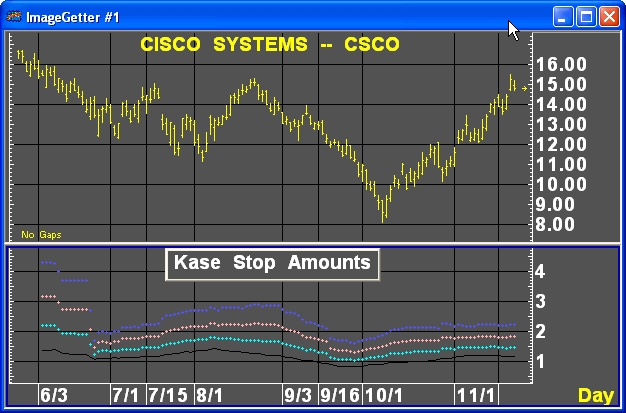
The final study in Aspens Kase package is a rigorous exit system. This stop system finds the optimal statistical balance between letting profits run, while cutting losses. Kase Stop Amount seeks an ideal stop level by accounting for volatility (risk), the variance in volatility (the change in volatility from bar to bar), and volatility skew (the propensity for volatility to occasionally spike incorrectly).
Kase Stop Amounts are set at points at which there is an increasing probability of reversal against the trend being statistically significant based on the log normal shape of the range curve. Setting stops will help you take as much risk as necessary to stay in a good position, but not more.

Interpretation
The stop amount tells the trader how much the actual dollar amount per unit is at risk at the warning line, and the three stop levels.
Parameters
The Kase Stop Amounts study for utilizes proprietary formulas to establish market indicators. While the formula can not be changed, subscribers are able to alter five of the study variables in order to customize the Stop Point signals.

There are nine study elements in the Kase Stop Amount indicator. Five elements are study variables:
Moving Avg. Length
Rounding
Price 1
Price 2
Price 3
Four elements are rendered:
Warning
Risk 1
Risk 2
Risk 3
|
Field |
Function |
|
Period |
Indicates the number of bars used to calculate the standard deviations for each variable used in the Stop Amount indicator.
Defaults: Moving Avg. Length 30 Rounding 3 StDevs Indicates the multiplier of the Standard Deviation for each Stop Amount indicator. Defaults: Warning 0.0 Risk 1 1.0 Risk 2 2.2 Risk 3 3.6
|
|
Price |
Indicates the price element (High, Low, Open, Close) used to calculate the Kase Stop Amount study.
Defaults:
Price 1 Close Price 2 High Price 3 Low
|
|
Color |
Indicates the color in which the respective study element is rendered.
Defaults:
Warning Black Risk 1 Cyan Risk 2 Pink Risk 3 Blue
|
|
Graph |
Indicates the rendering method for the respective study element.
Defaults:
Warning Line Risk 1 Dots Risk 2 Dots Risk 3 Dots
|
|
StdDevs |
|
|
Line Style |
|
|
Line Width |
|